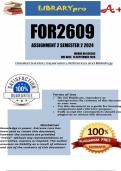FOR2609
ASSIGNMENT 2 SEMESTER 2 2024
UNIQUE NO.636945
DUE DATE: 16 SEPTEMBER 2024
, FOR2609
Assignment 2 Semester 2 2024
Unique Number: 636945
Due Date: 16 September 2024
Principles of Evidence in Forensic Investigation
Question 1: Understanding "Previous Consistent Statement"
A previous consistent statement refers to a statement made by a witness before the
trial, which aligns with their testimony in court. It is often used to show that the witness
has remained consistent in what they are saying. For example, if a witness reported a
crime to the police and then gave the same story in court, their previous statement to
the police can be used to back up their credibility. This is especially helpful if the
defense tries to claim the witness has changed their story or is lying. However, such
statements are usually only allowed if the witness's credibility has been attacked, such
as when they are accused of recently fabricating their version of events.
Question 2: Opinion Evidence and Its Exceptions
Opinion evidence is when a witness gives their personal interpretation or judgment
about something in the case, instead of just sticking to the facts. In general, courts
prefer factual evidence, but sometimes opinion evidence is allowed, especially if it helps
the court understand something that isn't obvious to a layperson.
For example, expert witnesses, such as forensic scientists, are often allowed to give
opinion evidence because they have specialized knowledge. A forensic expert might
offer an opinion about the cause of death in a murder case. Another exception is when
a non-expert witness gives an opinion about something ordinary, like someone




